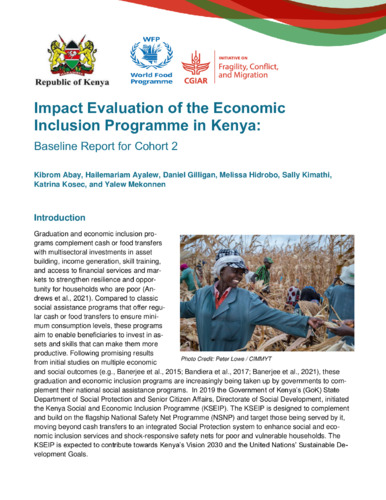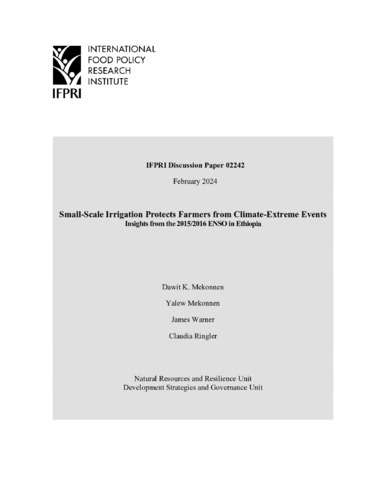Impact evaluation of the economic inclusion programme in Kenya: Baseline report for cohort 2
Graduation and economic inclusion programs complement cash or food transfers with multisectoral investments in asset building, income generation, skill training, and access to financial services and markets to strengthen resilience and opportunity for households who are poor (Andrews et al., 2021). Compared to classic social assistance programs that offer regular cash or food transfers to ensure minimum consumption levels, these programs aim to enable beneficiaries to invest in assets and skills that can make them more productive. Following promising results from initial studies on multiple economic Photo Credit: Peter Lowe / CIMMYT and social outcomes (e.g., Banerjee et al., 2015; Bandiera et al., 2017; Banerjee et al., 2021), these graduation and economic inclusion programs are increasingly being taken up by governments to complement their national social assistance programs. In 2019 the Government of Kenya’s (GoK) State Department of Social Protection and Senior Citizen Affairs, Directorate of Social Development, initiated the Kenya Social and Economic Inclusion Programme (KSEIP). The KSEIP is designed to complement and build on the flagship National Safety Net Programme (NSNP) and target those being served by it, moving beyond cash transfers to an integrated Social Protection system to enhance social and economic inclusion services and shock-responsive safety nets for poor and vulnerable households. The KSEIP is expected to contribute towards Kenya’s Vision 2030 and the United Nations’ Sustainable Development Goals.
Authors
Abay, Kibrom A.; Ayalew, Hailemariam; Gilligan, Daniel O.; Hidrobo, Melissa; Kimathi, Sally; Kosec, Katrina; Mekonnen, Yalew
Citation
Abay, Kibrom A.; Ayalew, Hailemariam; Gilligan, Daniel O.; Hidrobo, Melissa; Kimathi, Sally; Kosec, Katrina; and Mekonnen, Yalew. 2024. Impact evaluation of the economic inclusion programme in Kenya: Baseline report for cohort 2. Washington, DC: International Food Policy Research Institute.
Keywords
Africa; Sub-saharan Africa; Eastern Africa; Capacity Development; Impact Assessment; Economic Integration; Data
Project
Fragility, Conflict, and Migration







